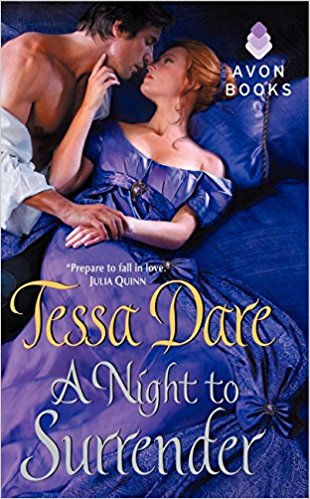 I’m pretty sure this is the first regency romance I’ve read (excepting Jane Austen) since I usually stick to contemporaries. This book reminded me of why that is—the men in that time were pretty horrible. Even the “good” ones. Also, corsets. Why do people think those are romantic? You can’t breathe in them. Breathing is important. It keeps you from passing out and stuff.
I’m pretty sure this is the first regency romance I’ve read (excepting Jane Austen) since I usually stick to contemporaries. This book reminded me of why that is—the men in that time were pretty horrible. Even the “good” ones. Also, corsets. Why do people think those are romantic? You can’t breathe in them. Breathing is important. It keeps you from passing out and stuff.
Anyway, Dare still does a good job with the story, even if it isn’t really for me.
Susanna Finch is pretty awesome. She’s clever and highly accomplished in a range of pursuits and very respected in the village (Spindle Cove) near the estate she lives on with her father. Her father is a well-known inventor, especially for his gun which is used extensively by English troops. And Susanna has grown up trying to please him, for example by learning to shoot, even though she can barely get his attention.
Enter Victor Bramwell. He’s an oversized officer with an injured leg who’s humoring Susanna’s father in an effort to get his command back. The man wants Bram to gather a militia in order to help him get back to the war. The problem? There aren’t too many men in Spindle Cove, as it’s basically a resort town catering to unusual or sickly ladies, thanks to Susanna’s efforts.
Susanna and Bram clash early on in this enemies-to-lovers story. She has no real interest in men, who failed to impress her during her one season in London. She’d much rather reign over the town as the helpful Miss Finch, solving any and all problems. Bram finds her irresistible but keeps telling himself that he’d better stay away from her since angering her father could endanger his career. Still, they keep running into each other and Susanna finds that she too is powerfully drawn to him.
As I’ve mentioned, I really liked Susanna, even if she was a little naïve in a way that didn’t quite fit her character in the beginning of the book. But Bram was another story. He wasn’t the worst kind of man for his times, as he liked the fact that Susanna was smart and capable. But he was still always wanting to possess her in a way that annoyed me. And he took liberties he shouldn’t have, such as when they first met, when he tackles her (for acceptable reasons) and kisses her (for fun). And he was always saying things like, Go over there and sit with the women, where you belong. She calls him a beast when he does stuff like that but basically laughs it off. Still, Bram grew on me a little and bugged me less in the second half of the book. The story itself gets more fun in the second half, too, when the women of the town get involved in helping the militia come to be.
Despite my reservations with Bram, Dare is a talented writer, creating a good story with witty dialogue and interesting secondary characters. And something happens with Susanna’s father that I wasn’t expecting, and I appreciated the surprise. The world-building is great, as I was definitely taken back to 1813. There are several laugh-out-loud moments, too. Perhaps more importantly, this is a steamy book and Susanna and Bram get creative when necessary.
If you’re like me and don’t enjoy being reminded of how horrible things used to be for women, this book probably isn’t for you. However, I can easily recommend it to fans of spicy regencies with believably strong heroines.